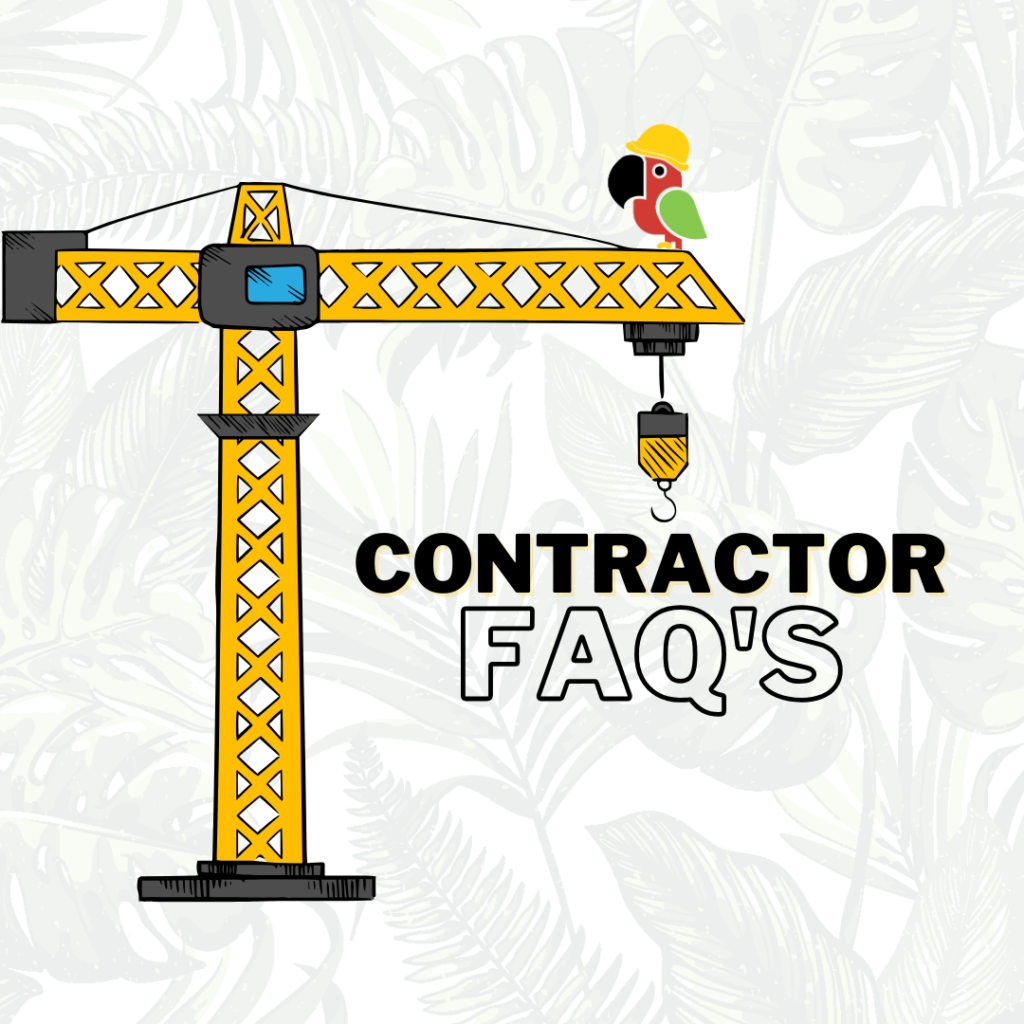Contractor Frequently Asked Questions
Contractor Frequently Asked Questions
- What is a surety bond?
- A surety bond is a three-party agreement between an obligee (owner), principal (contractor), and surety. A surety bond is a guarantee that the principal will perform the obligations according to the contract and if they do not then the surety can be held liable for the debt, default, or failure of the principal.
- Who do I go to when trying to obtain bonding?
- When trying to obtain bonding, you should contact a reputable and professional surety bond producer. Surety bond producers specialize in providing long-term surety support and resources.
- What documents do I need to start the bonding process?
- 3 fiscal-year-end financial statements
- Most recent interim financial statements (incl. aging AR & AP)
- Any bank agreements (loans, lines of credit, & recent LOC statement)
- Most recent personal financial statement
- Current work on hand/work in progress report
- Resume of all owners/key people within the company
- References letters from prior project owners
- Accomplishments of the company
- Statement of company qualifications
- Contractor questionnaire (producer will provide)
- What does my bond producer do for me?
- Your bond producer will provide invaluable information and business advice. Your producer will provide proficient financial statement analysis skills, timely responses, industry knowledge, and the willingness to guide you through the bonding process. Your Parrot Producer will ask questions and gather information to better understand your business model, business plan, and business goals. This helps the agent assess what bond or bond program needs are required today and what size and scope of bonds may be needed in the future. With this information, the producer will have a good idea of which surety company would be the best fit for your business. Your agent should want to build a relationship with you, as this allows the producer to create a plan to maximize your surety credit and drive the best bond terms for the long run, resulting in a competitive advantage for your company.
- Can I get a blanket bond for all my bonding needs?
- No. Each bond is tied to a specific contract/obligation; therefore, each contract/obligation must have its own bond.
- Why are bonds required?
- In 1935 the Miller Act was passed which requires federal construction contracts over $150,000 to furnish a performance and payment bond. Surety bonds provide the government with prequalification of contractors and as well as remedy should a contractor fail to perform or pay subcontractors and suppliers of a project.
- After the Miller Act was passed, states throughout the country saw the benefits surety bonds and began passing “Little Miller Acts”. Each state’s Little Miller Act has different requirements however, they all closely follow the Federal Miller Act.
- Why are my financial statements so important?
- Financial statements are important because they provide the surety of a sense of where the company stands financially. Financial statements are critical when a principal wants to maximize their bond program.
- What key items do sureties look for in a financial statement?
- The financial statement is prepared to GAAP standards
- Balance sheet
- Income statement
- Statement of cash flows
- Footnotes with any disclosures
- Current work on hand details (cost to complete, over/underbilling’s, etc.)
- If the financial statement is CPA prepared
- What factors are taken into consideration when trying to obtain a bond program?
- Capital
- Character
- Capacity
- What is a general indemnity agreement (GIA)?
- A general indemnity agreement is a contract between the principal and the surety. It is a legal document that guarantees that if there is a loss and the surety must pay out, the principal will make the surety whole again.
- What can cause cash flow issues on my financial statement?
- Standard payment procedures
- Payments being made to subcontractors and suppliers prior to the principal receiving payment from the owner
- Retainage on projects
- Purchasing assets with cash
- Accounts receivable not being collected in a timely manner
- Completed projects not being closed out
- Too much inventory
- What are the different income recognition methods?
- There are three accounting methods, completed contract method, accrual recognition method, and cash recognition method. For more information on these methods, check out this income recognition article (hyperlink).
- Can I get a blanket bond for all my bonding needs?
- No. Each bond is tied to a specific contract/obligation; therefore, each contract/obligation must have its own bond.
- Why are bonds required?
- In 1935 the Miller Act was passed, which requires federal construction contracts over $150,000 to furnish a performance and payment bond. Surety bonds provide the government with prequalification of contractors and as well as remedy should a contractor fail to perform or pay subcontractors and suppliers of a project. After the Miller Act was passed, states throughout the country saw the benefits surety bonds and began passing “Little Miller Acts”. Each state’s Little Miller Act has different requirements however, they all closely follow the Federal Miller Act.
- Why are my financial statements so important?
- Financial statements are important because they provide the surety of a sense of where the company stands financially. Financial statements are critical when a principal wants to maximize their bond program.
- What key items do sureties look for in a financial statement?
- The financial statement is prepared to GAAP standards.
- Balance sheet
- Income statement
- Statement of cash flows
- Footnotes with any disclosures
- Current work on hand details (cost to complete, over/underbilling’s, etc.)
- Level of preparation
- What factors are taken into consideration when trying to obtain a bond program
- Capital
- Character
- Capacity
- What are the different income recognition methods?
- a. There are three accounting methods, completed contract method, accrual recognition method, and cash recognition method.
- What is a general indemnity agreement (GIA)
- A general indemnity agreement is a contract between the principal and the surety. It is a legal document that guarantees that if there is a loss and the surety must pay out, the principal will make the surety whole again.
- What can cause cash flow issues on my financial statement?
- Standard payment procedures
- Payments being made to subcontractors and suppliers prior to the principal receiving payment from the owner.
- Retainage on projects
- Purchasing assets with cash.
- Accounts receivable are not being collected in a timely manner.
- Completed projects not being closed out.
- Too much inventory

- What is a surety bond?
- A surety bond is a three-party agreement between an obligee (owner), principal (contractor), and surety. A surety bond is a guarantee that the principal will perform the obligations according to the contract and if they do not then the surety can be held liable for the debt, default, or failure of the principal.
- Who do I go to when trying to obtain bonding?
- When trying to obtain bonding, you should contact a reputable and professional surety bond producer. Surety bond producers specialize in providing long-term surety support and resources.
- What documents do I need to start the bonding process?
- 3 fiscal-year-end financial statements
- Most recent interim financial statements (incl. aging AR & AP)
- Any bank agreements (loans, lines of credit, & recent LOC statement)
- Most recent personal financial statement
- Current work on hand/work in progress report
- Resume of all owners/key people within the company
- References letters from prior project owners
- Accomplishments of the company
- Statement of company qualifications
- Contractor questionnaire (producer will provide)
- What does my bond producer do for me?
- Your bond producer will provide invaluable information and business advice. Your producer will provide proficient financial statement analysis skills, timely responses, industry knowledge, and the willingness to guide you through the bonding process. Your Parrot Producer will ask questions and gather information to better understand your business model, business plan, and business goals. This helps the agent assess what bond or bond program needs are required today and what size and scope of bonds may be needed in the future. With this information, the producer will have a good idea of which surety company would be the best fit for your business. Your agent should want to build a relationship with you, as this allows the producer to create a plan to maximize your surety credit and drive the best bond terms for the long run, resulting in a competitive advantage for your company.
- Can I get a blanket bond for all my bonding needs?
- No. Each bond is tied to a specific contract/obligation; therefore, each contract/obligation must have its own bond.
- Why are bonds required?
- In 1935 the Miller Act was passed which requires federal construction contracts over $150,000 to furnish a performance and payment bond. Surety bonds provide the government with prequalification of contractors and as well as remedy should a contractor fail to perform or pay subcontractors and suppliers of a project.
- After the Miller Act was passed, states throughout the country saw the benefits surety bonds and began passing “Little Miller Acts”. Each state’s Little Miller Act has different requirements however, they all closely follow the Federal Miller Act.
- Why are my financial statements so important?
- Financial statements are important because they provide the surety of a sense of where the company stands financially. Financial statements are critical when a principal wants to maximize their bond program.
- What key items do sureties look for in a financial statement?
- The financial statement is prepared to GAAP standards
- Balance sheet
- Income statement
- Statement of cash flows
- Footnotes with any disclosures
- Current work on hand details (cost to complete, over/underbilling’s, etc.)
- If the financial statement is CPA prepared
- What factors are taken into consideration when trying to obtain a bond program?
- Capital
- Character
- Capacity
- What is a general indemnity agreement (GIA)?
- A general indemnity agreement is a contract between the principal and the surety. It is a legal document that guarantees that if there is a loss and the surety must pay out, the principal will make the surety whole again.
- What can cause cash flow issues on my financial statement?
- Standard payment procedures
- Payments being made to subcontractors and suppliers prior to the principal receiving payment from the owner
- Retainage on projects
- Purchasing assets with cash
- Accounts receivable not being collected in a timely manner
- Completed projects not being closed out
- Too much inventory
- What are the different income recognition methods?
- There are three accounting methods, completed contract method, accrual recognition method, and cash recognition method. For more information on these methods, check out this income recognition article (hyperlink).
- Can I get a blanket bond for all my bonding needs?
- No. Each bond is tied to a specific contract/obligation; therefore, each contract/obligation must have its own bond.
- Why are bonds required?
- In 1935 the Miller Act was passed, which requires federal construction contracts over $150,000 to furnish a performance and payment bond. Surety bonds provide the government with prequalification of contractors and as well as remedy should a contractor fail to perform or pay subcontractors and suppliers of a project. After the Miller Act was passed, states throughout the country saw the benefits surety bonds and began passing “Little Miller Acts”. Each state’s Little Miller Act has different requirements however, they all closely follow the Federal Miller Act.
- Why are my financial statements so important?
- Financial statements are important because they provide the surety of a sense of where the company stands financially. Financial statements are critical when a principal wants to maximize their bond program.
- What key items do sureties look for in a financial statement?
- The financial statement is prepared to GAAP standards.
- Balance sheet
- Income statement
- Statement of cash flows
- Footnotes with any disclosures
- Current work on hand details (cost to complete, over/underbilling’s, etc.)
- Level of preparation
- What factors are taken into consideration when trying to obtain a bond program
- Capital
- Character
- Capacity
- What are the different income recognition methods?
- a. There are three accounting methods, completed contract method, accrual recognition method, and cash recognition method.
- What is a general indemnity agreement (GIA)
- A general indemnity agreement is a contract between the principal and the surety. It is a legal document that guarantees that if there is a loss and the surety must pay out, the principal will make the surety whole again.
- What can cause cash flow issues on my financial statement?
- Standard payment procedures
- Payments being made to subcontractors and suppliers prior to the principal receiving payment from the owner.
- Retainage on projects
- Purchasing assets with cash.
- Accounts receivable are not being collected in a timely manner.
- Completed projects not being closed out.
- Too much inventory






